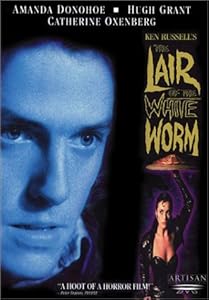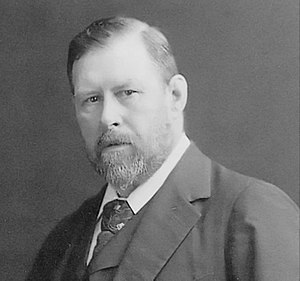 Cover of The Lair of the White Worm
Cover of The Lair of the White Worm Bram Stoker is a name that, surely, many people recognize well. He is, after all, the creator of the super villain, Dracula. This review, however, is of his tale, The Lair of the White Worm. I recognized the title from a horror film directed by Ken Russell that I watched more than ten years ago. I vaguely remember it being a very slow and almost dull movie up until the finale. That said, I remember taking pleasure in having watched it. Thus armed with vague memories of a good film, when I found a number of Stoker's books on display at Gutenberg.org, I felt drawn to the title. I feel compelled to watch the film again to see how closely it remembered the book.
This book follows the same genre as Dracula. That is, it is a horror. In fact, it is really two horrors, a lesser and a greater, which intertwine with the hero.
 Image via WikipediaThe story starts with the protagonist: one Adam Salton from Australia. He is invited to stay with his uncle in England who is without wife or child. Thus, Adam is to become his heir and close family. The conflict begins not too long after the arrival of a wealthy land owner, Edgar Caswell, arrives.
Image via WikipediaThe story starts with the protagonist: one Adam Salton from Australia. He is invited to stay with his uncle in England who is without wife or child. Thus, Adam is to become his heir and close family. The conflict begins not too long after the arrival of a wealthy land owner, Edgar Caswell, arrives. For some inexplicable reason, both Caswell and Salton fall for a couple of farm girls. For a long time I am convinced that they are after the same girl, but after awhile, it turns out they were after different girls. Meanwhile, Lady Arabella has her sights on Caswell; less from chemistry or love at first sight than him having a great deal of wealth and her being on the verge of bankrupt, and seeing an opportunity to once again be supported by a wealthy husband.
 Image via WikipediaIt's a malange a quatre, really. Caswell tries to win his girl through the use of the semi-magical semi-scientific art of mesmerism. She resists successfully, but is ultimately destroyed by his power. Lady Arabella, along with her enormous pet worm, are destroyed by Salton, and Mimi and Adam Salton get married and live happily ever after.
Image via WikipediaIt's a malange a quatre, really. Caswell tries to win his girl through the use of the semi-magical semi-scientific art of mesmerism. She resists successfully, but is ultimately destroyed by his power. Lady Arabella, along with her enormous pet worm, are destroyed by Salton, and Mimi and Adam Salton get married and live happily ever after.There is one thing to make note of if you're considering reading this book: there is one black character in this story: Oolanga. Often he is referred to as a nigger. I asked myself the question, at first, of whether it was a natural use (commonly used, but without hatred), but he is often derided as being an inferior amongst inferiors. I get the definite sense that Stoker did not like black people. It is not overly thick with racist tone, however, and its effect is limited and not terribly severe. However, one ought to be aware that this type of language exists in the book. Many people would object.
That said, I'd say read the book. It was ultimately a great weird tale.

No comments:
Post a Comment